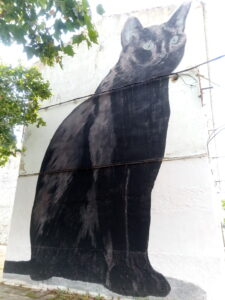A journey parallel to dystopia
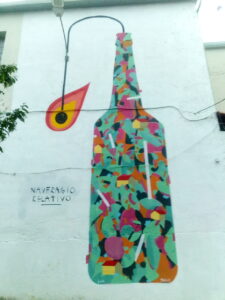
This alphabet soup is the narration of a sound journey in space and time. It is loosely based and inspired on events occurred during summer 2020. It has been written for the love of writing, and with no other intent.
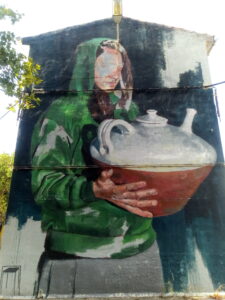
Traveling alone is a unique way to travel, because it brings the journey to the center of the experience. The partial lifting of the lock-down in some European areas opened a small window of opportunity for the author to encounter people and groups. I, the author, stand for a world where everyone can travel alone safely, and at the same time experience the uncertainty that seduces us, that offers us teachable moments.
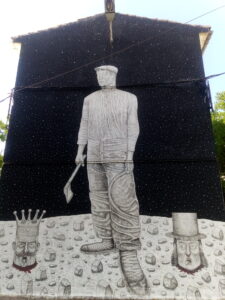
Yet until this day, the contexts where exposed solo journeys are an affordable risk to more than just a few are very rare.
“O my soul, do not aspire to immortal life, but exhaust the limits of the possible.” Pindar
Billy Holiday,
born as Eleonora Fagan in April 1915 is for many the best voice of Jazz. She lived a hard live for being women, poor and black. We learn about her ordeals and successes through her memoir, and through her heartrending voice.
“Trav’lin’ All Alone”, Billy Holiday, 1937.
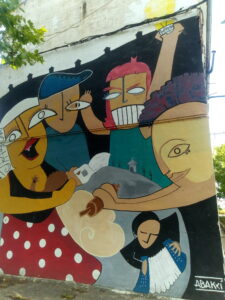
Her mum was a young teenager when she gave birth. From early age Billy took on the hard jobs that where available for her, barely making enough to live and enduring plenty of hardness from the Baltimore of the time. She loved singing, but never thought that music was work. On her words, singing was like eating Peking style duck, and she loved Peking style Duck!
The necessary impact, all and only
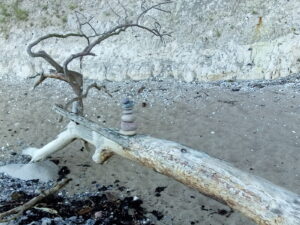
The network Rhythms of Resistance (RoR) celebrates its 20th anniversary this year of 2020. This network was born from other networks and social movements. You can explore other moments of this fluffy social ecosystem in this same website ( www.rhythms-of-resistance.org).
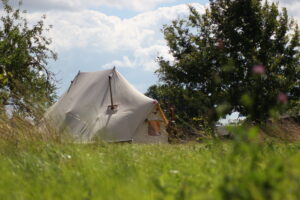
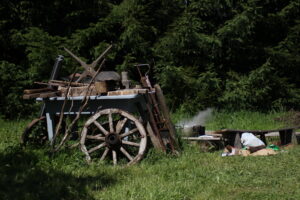
In Mackeliskiai, rural Lithuania, about 30 people gather during a short inter-apocalyptic oasis for a regional meeting of RoR. It is late July, the straw is packed in roll bales that lay around on the fields like soft landed meteorites. In response to the invitation of the local bands, people from an array of European countries made their way to the camp. The camp happens at an old farm house surrounded by apple trees, a couple of barns and medium-large cereal fields. With 4 to 6 months of quarantine behind them, the sambistas enjoy being in a bigger group of at first mostly strangers. No, they are not strangers. No one is a stranger in this thousand strong network.
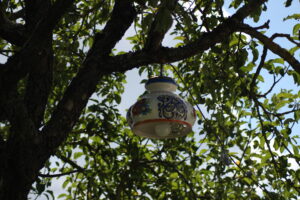
At the camp, the food is vegan (or mostly; there was something suspiciously cheese like roaming around in the fridge). Vegan food is just like old good food, without animal cruelty.

Sooner or later, after eating a delicious vegan feast (that is the norm at this camp) humans with a functional digesting track do tend to pay a visit to the toilet. Here the toilets are grounded. Instead of sending the human ejects straight back into the natural water systems, they stay in place where they fall (a hole in the ground) to slowly decompose into soil. Soil that later will sustain crops. Crops that will become food.
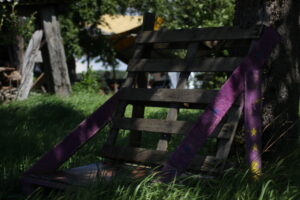
The camp runs on human power. Participants volunteer to clean, wash, cook and maintain the necessary infrastructure running. Without the reproductive work no drumming would be possible. This kind of work falls disproportionate on the shoulders of women in our society, specially women of color. 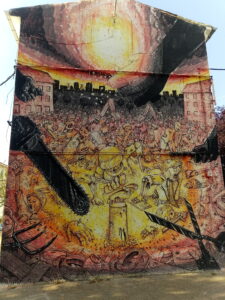
To counter this and other bias, people at the camp discuss and observe critically roles and behaviours that, in small scale, may reproduce or feed systems of oppression.
The existing systems of oppression generate debt. This debt, unlike the debt that pumps ever growing capitalism, cannot be quantified in any currency, and yet is very real. Ecological debt. Our species is in debt with others in this planet because we continue to channel way more than our fair share of resources and natural sinks to cater for our interests. Care debt. 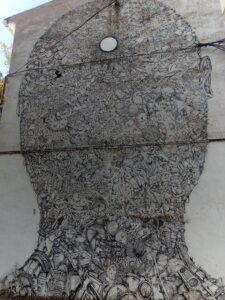 Cis-gendered males are in debt because they more often than not neglect their due in care and reproductive work. Peoples debt. Besides the rampant racism that exists today, white nations have accrued a historical debt upon the backs of people of color around the world.
Cis-gendered males are in debt because they more often than not neglect their due in care and reproductive work. Peoples debt. Besides the rampant racism that exists today, white nations have accrued a historical debt upon the backs of people of color around the world.
“Strange fruit” Billy Holiday 1939.
Miguel Hernández
Spanish poet born in Orihuela in 1910, a people’s poet. He was offered a scholarship but had to drop out from school to help his poor family herding goats. He knew in his heart he was to be a poet, and became political out of need as he witnessed and experienced first hand the inhumane conditions of exploitation under which the peasants where living in the Spain of the time. On his own words, “Poetry is in me a necessity and I write because I see no remedy for not writing. […] In war I write it as a weapon, and in peace it will be a weapon too, though a quiet one”.
Vientos del pueblo me llevan,
vientos del pueblo me arrastran,
me esparcen el corazón
y me aventan la garganta.[…]
Cantando espero a la muerte,
que hay ruiseñores que cantan
encima de los fusiles
y en medio de las batallas.“Vientos del pueblo me llevan”, Miguel Hernández, 1937.
When the fascist coup fails and the Spanish Civil War breaks out, July 1936, Miguel enrolls himself in the republican army and continues writing. He is assigned a position as cultural commissioner and in 1937 he is sent to the southern front. It will stay with him the bloody landscape of the war fields and trenches. There he reads aloud his poems.
Mi vida es una herida de juventud dichosa.
¡Ay de quien no esté herido, de quien jamás se siente
herido por la vida, ni en la vida reposa
herido alegremente![…]
Para la libertad me desprendo a balazos
de los que han revolcado su estatua por el lodo.
Y me desprendo a golpes de mis pies, de mis brazos,
de mi casa, de todo.Porque donde unas cuencas vacías amanezcan,
ella pondrá dos piedras de futura mirada
y hará que nuevos brazos y nuevas piernas crezcan
en la carne talada.“El herido”, Miguel Hernández, 1938
He will die in prison in 1942, not long after the war was lost, leaving behind a legacy of eternal verses.
Lo que cada una lleva al maestreo
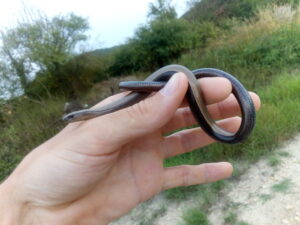

Un ser humano es un sistema complejo, un planeta vivo. Un sistema que no vive aislado, al contrario está en permanente intercambio con su entorno. La música es un lenguaje que está en todas partes. Al comunicarnos con la música, intentamos transmitir un mensaje, con armonía, con un ritmo, en sintonía con otr@s cuando tocamos en una banda. Al hacerlo imprimimos en el mensaje una parte de nosotras mismas. Es cómo si tallásemos una obra de arte intangible, que llevase nuestra firma, que dimos forma con nuestros dedos y en la que nos reconocemos. La música que tocamos es fruto de ese permanente intercambio con nuestro entorno, lleva el registro de encuentros y momentos anteriores.
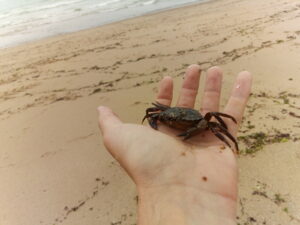
Un ejemplo, es el maestreo. En la samba de RoR una persona cada vez va dirigiendo la música, marca el ritmo e introduce variaciones sobre la melodía base. A diferencia de otras formaciones más tradicionales, en RoR maestrea toda aquella persona que lo desea (no hay más requisito que querer hacerlo). Y cada persona maestrea de una forma única. Se reconocen así estilos tranquilos, tropicales, con mucho sentimiento.
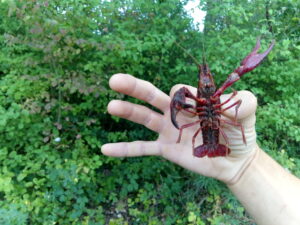
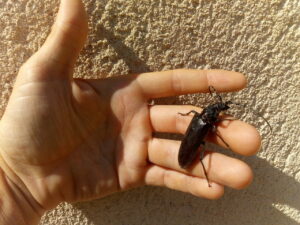
La maestre se bambolea al son de diez tambores vibrando a 60 pulsos por minuto. También los hay discotequeros, agitados, con gestos bruscos, inequívocos. En ellos, los brazos de la maestre son cómo tentáculos, látigos que cortan el aire en sincronía con el ritmo. Los hay también exigentes, excitados, buscadores del clímax. Los hay centrados, de confianza, cercanos a la banda. Estilos tímidos, estilos abiertos, estilos geniales y también crípticos. En su maestreo, regala la persona un aspecto de si misma, lo inyecta en el ritmo, lo devuelve a la banda. A través de los años, los estilos han cambiado, han ido y han vuelto. Quién ha tenido el privilegio de seguir a la red por mucho tiempo, reconoce los ecos de esta y de aquella manera de dirigir. Cómo un río, siempre es el mismo, y nunca es igual.

The roof is on fire
“It’s too hot for words” Billy Holiday 1935.
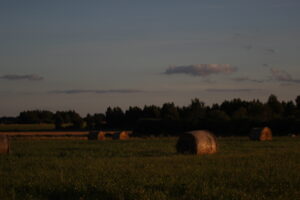
En la noche las almas se buscan en los lugares más cálidos. Junto al fuego, o en la sauna. Despiertan los corazones hambrientos, corazones cansados del forzado ayuno social. Se fraguan, en círculo junto a la hoguera historias de plata y de luna. Se trenzan las voces fundidas con el humo en cantos de Sutartinės, espirituales y tonadas revolucionarias.
Alba que das a mis noches
un resplandor rojo y blanco.
Boca poblada de bocas:
pájaro lleno de pájaros.[…]
El labio de arriba el cielo
y la tierra el otro labio.[…]
Beso en tu boca por ellos,
brindo en tu boca por tantos
que cayeron sobre el vino
de los amorosos vasos.“La boca” Miguel Hernández, 1939-1942
Al fin, the end.
